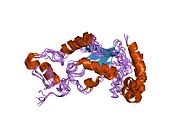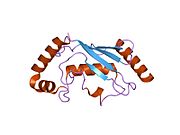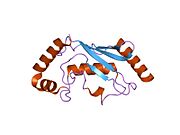UBE2D3

Ubiquitin-conjugating enzyme E2 D3 is a protein that in humans is encoded by the UBE2D3 gene.[5][6]
Function
[edit]The modification of proteins with ubiquitin is an important cellular mechanism for targeting abnormal or short-lived proteins for degradation. Ubiquitination involves at least three classes of enzymes: ubiquitin-activating enzymes, or E1s, ubiquitin-conjugating enzymes, or E2s, and ubiquitin-protein ligases, or E3s. This gene encodes a member of the E2 ubiquitin-conjugating enzyme family. This enzyme functions in the ubiquitination of the tumor-suppressor protein p53, which is induced by an E3 ubiquitin-protein ligase. Multiple spliced transcript variants have been found for this gene, but the full-length nature of some variants has not been determined.[6]
Interactions
[edit]UBE2D3 has been shown to interact with NEDD4.[7][8]
References
[edit]- ^ a b c GRCh38: Ensembl release 89: ENSG00000109332 – Ensembl, May 2017
- ^ a b c GRCm38: Ensembl release 89: ENSMUSG00000078578 – Ensembl, May 2017
- ^ "Human PubMed Reference:". National Center for Biotechnology Information, U.S. National Library of Medicine.
- ^ "Mouse PubMed Reference:". National Center for Biotechnology Information, U.S. National Library of Medicine.
- ^ Jensen JP, Bates PW, Yang M, Vierstra RD, Weissman AM (Dec 1995). "Identification of a family of closely related human ubiquitin conjugating enzymes". The Journal of Biological Chemistry. 270 (51): 30408–14. doi:10.1074/jbc.270.51.30408. PMID 8530467.
- ^ a b "Entrez Gene: UBE2D3 ubiquitin-conjugating enzyme E2D 3 (UBC4/5 homolog, yeast)".
- ^ Anan T, Nagata Y, Koga H, Honda Y, Yabuki N, Miyamoto C, Kuwano A, Matsuda I, Endo F, Saya H, Nakao M (Nov 1998). "Human ubiquitin-protein ligase Nedd4: expression, subcellular localization and selective interaction with ubiquitin-conjugating enzymes". Genes to Cells. 3 (11): 751–63. doi:10.1046/j.1365-2443.1998.00227.x. PMID 9990509. S2CID 1653536.
- ^ Wang X, Shi Y, Wang J, Huang G, Jiang X (Sep 2008). "Crucial role of the C-terminus of PTEN in antagonizing NEDD4-1-mediated PTEN ubiquitination and degradation". The Biochemical Journal. 414 (2): 221–9. doi:10.1042/BJ20080674. PMID 18498243.
Further reading
[edit]- Scheffner M, Huibregtse JM, Howley PM (Sep 1994). "Identification of a human ubiquitin-conjugating enzyme that mediates the E6-AP-dependent ubiquitination of p53". Proceedings of the National Academy of Sciences of the United States of America. 91 (19): 8797–801. Bibcode:1994PNAS...91.8797S. doi:10.1073/pnas.91.19.8797. PMC 44693. PMID 8090726.
- Rogakou EP, Pilch DR, Orr AH, Ivanova VS, Bonner WM (Mar 1998). "DNA double-stranded breaks induce histone H2AX phosphorylation on serine 139". The Journal of Biological Chemistry. 273 (10): 5858–68. doi:10.1074/jbc.273.10.5858. PMID 9488723.
- Anan T, Nagata Y, Koga H, Honda Y, Yabuki N, Miyamoto C, Kuwano A, Matsuda I, Endo F, Saya H, Nakao M (Nov 1998). "Human ubiquitin-protein ligase Nedd4: expression, subcellular localization and selective interaction with ubiquitin-conjugating enzymes". Genes to Cells. 3 (11): 751–63. doi:10.1046/j.1365-2443.1998.00227.x. PMID 9990509. S2CID 1653536.
- Gonen H, Bercovich B, Orian A, Carrano A, Takizawa C, Yamanaka K, Pagano M, Iwai K, Ciechanover A (May 1999). "Identification of the ubiquitin carrier proteins, E2s, involved in signal-induced conjugation and subsequent degradation of IkappaBalpha". The Journal of Biological Chemistry. 274 (21): 14823–30. doi:10.1074/jbc.274.21.14823. PMID 10329681.
- Orian A, Gonen H, Bercovich B, Fajerman I, Eytan E, Israël A, Mercurio F, Iwai K, Schwartz AL, Ciechanover A (Jun 2000). "SCF(beta)(-TrCP) ubiquitin ligase-mediated processing of NF-kappaB p105 requires phosphorylation of its C-terminus by IkappaB kinase". The EMBO Journal. 19 (11): 2580–91. doi:10.1093/emboj/19.11.2580. PMC 212749. PMID 10835356.
- Coleman CS, Pegg AE (Aug 2001). "Polyamine analogues inhibit the ubiquitination of spermidine/spermine N1-acetyltransferase and prevent its targeting to the proteasome for degradation". The Biochemical Journal. 358 (Pt 1): 137–45. doi:10.1042/0264-6021:3580137. PMC 1222041. PMID 11485561.
- Chen A, Kleiman FE, Manley JL, Ouchi T, Pan ZQ (Jun 2002). "Autoubiquitination of the BRCA1*BARD1 RING ubiquitin ligase". The Journal of Biological Chemistry. 277 (24): 22085–92. doi:10.1074/jbc.M201252200. PMID 11927591.
- Obin M, Lee BY, Meinke G, Bohm A, Lee RH, Gaudet R, Hopp JA, Arshavsky VY, Willardson BM, Taylor A (Nov 2002). "Ubiquitylation of the transducin betagamma subunit complex. Regulation by phosducin". The Journal of Biological Chemistry. 277 (46): 44566–75. doi:10.1074/jbc.M205308200. PMID 12215439.
- Takeyama K, Aguiar RC, Gu L, He C, Freeman GJ, Kutok JL, Aster JC, Shipp MA (Jun 2003). "The BAL-binding protein BBAP and related Deltex family members exhibit ubiquitin-protein isopeptide ligase activity". The Journal of Biological Chemistry. 278 (24): 21930–7. doi:10.1074/jbc.M301157200. PMID 12670957.
- Brzovic PS, Keeffe JR, Nishikawa H, Miyamoto K, Fox D, Fukuda M, Ohta T, Klevit R (May 2003). "Binding and recognition in the assembly of an active BRCA1/BARD1 ubiquitin-ligase complex". Proceedings of the National Academy of Sciences of the United States of America. 100 (10): 5646–51. Bibcode:2003PNAS..100.5646B. doi:10.1073/pnas.0836054100. PMC 156255. PMID 12732733.
- Tang ED, Wang CY, Xiong Y, Guan KL (Sep 2003). "A role for NF-kappaB essential modifier/IkappaB kinase-gamma (NEMO/IKKgamma) ubiquitination in the activation of the IkappaB kinase complex by tumor necrosis factor-alpha". The Journal of Biological Chemistry. 278 (39): 37297–305. doi:10.1074/jbc.M303389200. PMID 12867425.
- Subramaniam V, Li H, Wong M, Kitching R, Attisano L, Wrana J, Zubovits J, Burger AM, Seth A (Oct 2003). "The RING-H2 protein RNF11 is overexpressed in breast cancer and is a target of Smurf2 E3 ligase". British Journal of Cancer. 89 (8): 1538–44. doi:10.1038/sj.bjc.6601301. PMC 2394340. PMID 14562029.
- Lehner B, Semple JI, Brown SE, Counsell D, Campbell RD, Sanderson CM (Jan 2004). "Analysis of a high-throughput yeast two-hybrid system and its use to predict the function of intracellular proteins encoded within the human MHC class III region". Genomics. 83 (1): 153–67. doi:10.1016/S0888-7543(03)00235-0. PMID 14667819.
- Saville MK, Sparks A, Xirodimas DP, Wardrop J, Stevenson LF, Bourdon JC, Woods YL, Lane DP (Oct 2004). "Regulation of p53 by the ubiquitin-conjugating enzymes UbcH5B/C in vivo". The Journal of Biological Chemistry. 279 (40): 42169–81. doi:10.1074/jbc.M403362200. PMID 15280377.
- Rual JF, Venkatesan K, Hao T, Hirozane-Kishikawa T, Dricot A, Li N, Berriz GF, Gibbons FD, Dreze M, Ayivi-Guedehoussou N, Klitgord N, Simon C, Boxem M, Milstein S, Rosenberg J, Goldberg DS, Zhang LV, Wong SL, Franklin G, Li S, Albala JS, Lim J, Fraughton C, Llamosas E, Cevik S, Bex C, Lamesch P, Sikorski RS, Vandenhaute J, Zoghbi HY, Smolyar A, Bosak S, Sequerra R, Doucette-Stamm L, Cusick ME, Hill DE, Roth FP, Vidal M (Oct 2005). "Towards a proteome-scale map of the human protein-protein interaction network". Nature. 437 (7062): 1173–8. Bibcode:2005Natur.437.1173R. doi:10.1038/nature04209. PMID 16189514. S2CID 4427026.
- Kimura K, Wakamatsu A, Suzuki Y, Ota T, Nishikawa T, Yamashita R, Yamamoto J, Sekine M, Tsuritani K, Wakaguri H, Ishii S, Sugiyama T, Saito K, Isono Y, Irie R, Kushida N, Yoneyama T, Otsuka R, Kanda K, Yokoi T, Kondo H, Wagatsuma M, Murakawa K, Ishida S, Ishibashi T, Takahashi-Fujii A, Tanase T, Nagai K, Kikuchi H, Nakai K, Isogai T, Sugano S (Jan 2006). "Diversification of transcriptional modulation: large-scale identification and characterization of putative alternative promoters of human genes". Genome Research. 16 (1): 55–65. doi:10.1101/gr.4039406. PMC 1356129. PMID 16344560.














